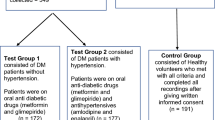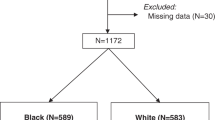Abstract
The aim of this study was to assess the association of the angiotensinogen M235T polymorphism with arterial blood pressure (BP) at rest and under physical stress in a homogeneous large-scale study population. In all, 1903 men who passed routine medical examination for military flying duty were recruited. BP and heart rate were measured at rest, during, and after bicycle ergometry. Genotyping for the AGT M235T polymorphism was carried out by PCR and RFLP technique. The AGT T235 allele was associated with a significantly higher diastolic BP (n=1903; MM 81±8, MT 83±7, TT 83±8; P=0.003). Pulse pressure (PP) at rest differed significantly between AGT genotypes (n=1903; MM 51±10 mmHg, MT 49±10 mmHg, TT 49±10 mmHg; P=0.001). During physical activity, BP values showed no significant difference between genotypes. In healthy young men, the AGT T235 allele is significantly associated with elevated diastolic BP but also reduced PP at rest. During physical activity, the AGT polymorphism had no impact on blood pressure, indicating the existence of other counteracting mechanisms, which might balance the influence of this gene.
This is a preview of subscription content, access via your institution
Access options
Subscribe to this journal
Receive 12 digital issues and online access to articles
$119.00 per year
only $9.92 per issue
Buy this article
- Purchase on Springer Link
- Instant access to full article PDF
Prices may be subject to local taxes which are calculated during checkout

Similar content being viewed by others
References
Jeunemaitre X et al. Molecular basis of human hypertension: role of angiotensinogen. Cell 1992; 71: 169–180.
Caulfield M et al. Linkage of the angiotensinogen gene to essential hypertension. N Engl J Med 1994; 330: 1629–1633.
Tiret L et al. Genetic variation at the angiotensinogen locus in relation to high blood pressure and myocardial infarction: the ECTIM Study. J Hypertens 1995; 13: 311–317.
Schunkert H et al. The angiotensinogen T235 variant and the use of antihypertensive drugs in a population-based cohort. Hypertension 1997; 29: 628–633.
Kunz R et al. Association between the angiotensinogen 235T-variant and essential hypertension in whites: a systematic review and methodological appraisal. Hypertension 1997; 30: 1331–1337.
Rotimi C et al. Hypertension, serum angiotensinogen, and molecular variants of the angiotensinogen gene among Nigerians. Circulation 1997; 95: 2348–2350.
Niu T et al. Angiotensinogen gene and hypertension in Chinese. J Clin Invest 1998; 101: 188–194.
Hingorami AD et al. Blood pressure and the M235T polymorphism of the angiotensinogen gene. Hypertension 1996; 28: 907–911.
Brand E et al. Evaluation of the angiotensinogen locus in human essential hypertension: a European study. Hypertension 1998; 31: 725–729.
Tiret L et al. Gene polymorphisms of the renin–angiotensin system in relation to hypertension and parental history of myocardial infarction and stroke: the PEGASE study. Projet d'Etude des Gene de l'Hypertension Arterielle Severe a moderee Essentielle. J Hypertens 1998; 16: 37–44.
Vasan RS et al. Impact of high-normal blood pressure on the risk of cardiovascular disease. New Engl J Med 2001; 345: 1291–1297.
Rankinen T et al. AGT M235T and ACE ID polymorphisms and exercise blood pressure in the HERITAGE Family Study. Am J Physiol Heart Circ Physiol 2000; 279: H368–H374.
Acknowledgements
This study was supported by the START program of the University Hospital of Aachen. The work resulting in this report was performed under German Federal Ministry of Defense Contract 21L2-S-200103. The opinions expressed in this paper are those of the authors and do not necessarily reflect the opinions or official policy of the German Federal Ministry of Defense. We gratefully acknowledge the support of the medical assistants of Dep. I and the backing of Dep. III of the German Air Force Institute of Aviation Medicine.
JR Ortlepp designed the study, did statistical data analysis, J Metrikat coordinated and realized data collection, M Albrecht and P Maya-Pelzer helped with data collection, V Mevissen, F Schmitz, and K Zerres fulfilled genetic analysis, P Hanrath, K Zerres, and R Hoffmann took part in interpretation of data and critical revision. All authors helped to write the report. This work is part of the doctoral thesis of JM Conflict of Interest Statement: None declared.
Author information
Authors and Affiliations
Corresponding author
Rights and permissions
About this article
Cite this article
Ortlepp, J., Metrikat, J., Mevissen, V. et al. Relation between the angiotensinogen (AGT) M235T gene polymorphism and blood pressure in a large, homogeneous study population. J Hum Hypertens 17, 555–559 (2003). https://doi.org/10.1038/sj.jhh.1001587
Received:
Revised:
Accepted:
Published:
Issue Date:
DOI: https://doi.org/10.1038/sj.jhh.1001587
Keywords
This article is cited by
-
Sex-specific effects of ACE I/D and AGT-M235T on pulse pressure: the HyperGEN Study
Human Genetics (2007)



